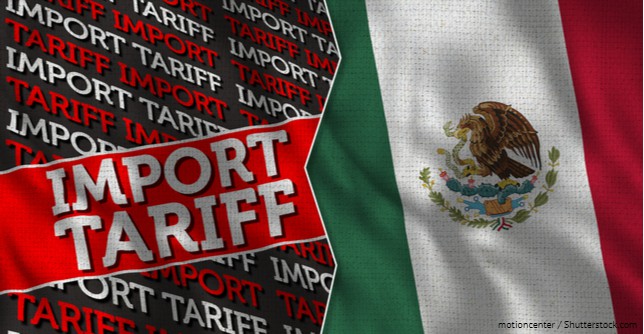There was a significant outcry among customs brokers at the southern border after President Trump tweeted last week that he plans to impose tariffs on all goods from Mexico to pressure the United States’ southern neighbor to curb illegal migration flows, one representative of brokers told American Shipper.
Customs brokers and freight forwarders are warning that President Donald Trump’s plan to impose tariffs, starting Monday, on all goods from Mexico could have severe impacts on trade.
“The National Customs Brokers and Forwarders Association of America (NCBFAA) is gravely concerned over the president’s threat to impose escalating tariffs on all products imported from Mexico beginning June 10,” NCBFAA President Amy Magnus said in a letter sent Wednesday to Senate Majority Leader Mitch McConnell, R-Ky. “If allowed to occur, the impact will be swift and severe.”
The reaction from customs brokers along the southern border was very forceful after Trump tweeted on May 31 that he intends to impose tariffs on Mexico starting at 5% and to potentially increase the tariffs unless Mexico stops the flow of illegal migration into the U.S., NCBFAA legislative representative Jon Kent told American Shipper.
Congressional lawmakers are contemplating the possibility of a resolution of disapproval that would counter Trump’s proposal to declare a national emergency and impose tariffs on all goods from Mexico.
“Commandeering U.S. trade policy to influence border security is an abuse of power,” House Ways and Means Committee Chairman Richard Neal, D-Mass., said in a statement. “If the president does declare a national emergency and attempt to put these tariffs into place, I will introduce a resolution of disapproval to stop his overreach.”
Speaking on CNBC on Tuesday, Sen. Rob Portman, R-Ohio, said if tariffs take effect Monday, Congress is likely to hold a vote, because Trump would impose the tariffs under the International Emergency Economic Powers Act, and overturning any action taken under that statute would require a joint resolution of disapproval to be passed by both chambers.
But to be ultimately successful, the measure would have to pass with veto-proof majorities in both the Senate and the House, as Trump almost certainly would veto any legislation passed without the necessary votes to secure against a veto.
U.S. and Mexican officials have been meeting at the White House this week in hopes of finding a resolution on immigration issues that could prevent the imposition of tariffs.
If the tariffs take effect Monday, every minimum continuous bond filed by customs brokers on behalf of importers will be insufficient in this month, as reviewing financials to raise the bond limits takes weeks, Eduardo Acosta, vice president of the Pacific Coast Council of Customs Brokers and Freight Forwarders Association (PCC), wrote in a letter to U.S. Trade Representative Robert Lighthizer and Acting Homeland Security Secretary Kevin McAleenan.
Further, financial burden on brokers is beyond their capacity, as small importers that import one entry per day with average values of $50,000 per invoice, would be subject to $50,000 in tariffs this month, states the letter, which also was sent to several U.S. lawmakers.
“This means, for example, that a broker on the southern border with 100 such importer clients will be responsible for payment of $5 million in duties for June alone,” he said. “This dollar amount exceeds most brokers’ capacity.”
NCBFAA’s Magnus noted that Mexico recently became the United States’ largest trading partner and is a close U.S. ally with which the U.S. just completed negotiations for a revamped trade agreement.
Disruptions caused by tariffs on Mexico would be significant, raising costs for U.S. businesses that will negatively affect the whole U.S. economy, Magnus said.
NCBFAA is calling on Congress to schedule a vote on a resolution of disapproval or “take whatever other legislative actions” necessary to prevent the tariffs from taking effect.
“Congress cannot allow this to happen,” Magnus wrote. “To levy tariffs on one of our closest allies under the International Emergency Economic Powers Act (IEEPA) is a clear abuse of statutory authority. The IEEPA is a tool meant for imposing economic sanctions on America’s enemies and adversaries in the face of ‘unusual and extraordinary threats,’ not as a bludgeon against valued trading partners.”











